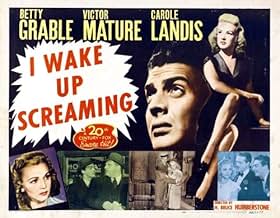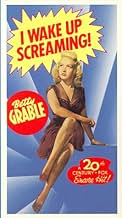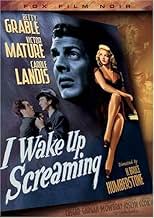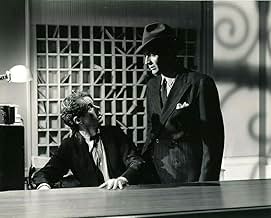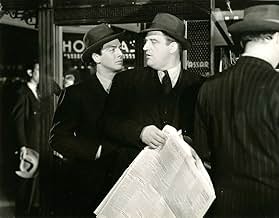CALIFICACIÓN DE IMDb
7.2/10
5.7 k
TU CALIFICACIÓN
Agrega una trama en tu idiomaWhy is Inspector Ed Cornell trying to railroad Frankie Christopher for the murder of model Vicky Lynn?Why is Inspector Ed Cornell trying to railroad Frankie Christopher for the murder of model Vicky Lynn?Why is Inspector Ed Cornell trying to railroad Frankie Christopher for the murder of model Vicky Lynn?
- Dirección
- Guionistas
- Elenco
- Premios
- 2 premios ganados en total
May Beatty
- Lady Handel
- (as Mae Beatty)
Brooks Benedict
- Nightclub Patron
- (sin créditos)
Edward Biby
- Nightclub Patron
- (sin créditos)
Stanley Blystone
- Police Detective
- (sin créditos)
- Dirección
- Guionistas
- Todo el elenco y el equipo
- Producción, taquilla y más en IMDbPro
Opiniones destacadas
A pretty waitress is given a shot at the big time by a handsome sports impresario. She grabs her chance with alacrity, but Fate has plotted a different course for her ...
Bruce Humberstone directs this attractive early noir with a strong sense of visual style. His Director of Photography, Edward Cronjager, works wonders with elongated shadows and labyrinths of lattice.
Victor Mature looks good as Frankie Christopher, the romantic lead. Always a fairly limited actor, he never the less captures his character's ambivalence sufficiently well for the viewer to be kept wondering about him until the final reel. But for all Mature's efforts, Frankie remains a lightweight. He spends more time onscreen than anyone else, but remains in the viewer's memory less successfully than the other three leads.
After almost a decade in films, Betty Grable was 25 years old in 1941 and already an established star when she took on the role of Jill Lynne. Her character has psychological depth, and Grable does justice to the part. Jill is the slightly staid older sister of Vicky the glamour girl. While Vicky gives free rein to her every whim, Jill suppresses her id, but her yearnings are simmering just below the surface.
Of course, those legendary Grable legs have to be put on display, and we get three glimpses of Hollywood's most-insured thighs - first when the two sisters flounce around in robes, discussing the letter, then when Jill accompanies Frankie to the Lido Plunge, and finally when she is tottering up firescapes and over rooftops in her high heels.
Inspector Ed Cornell is a figure of stature, apparently a good guy, but one who fills the viewer with a sense of uneasy foreboding. Laird Cregar captures brilliantly the bleakness and creepiness of Cornell, the cop who starts the movie as a silent shadow, but who grows inexorably to dominate the proceedings. The moment when Jill meets Cornell for the first time is a very dramatic one, just as Vicky's first encounter with the eerie detective was disturbing. Robin Ray (Alan Mowbray) breaks down under interrogation, and Cornell's stillness as the suspect sobs is rather unsettling. "You're not a cop looking for a murderer," Cornell is told, and we become increasingly aware that this repressed man is conducting some kind of unhealthy personal crusade. It is only at the very end of the film that Cornell displays any emotion, and then the floodgates open.
Carole Landis, the ill-starred actress who plays Vicky Lynne, deserves a special mention. Like her character, whose fictional tragedy she paralleled in her own life, Landis was a victim of her own beauty. A tough but brittle radiance, total self-absorption and an impatience with the trappings of success ("I've got about as much privacy as a lingerie mannequin!") are Vicky's salient attributes, but could be said to apply to Landis herself. She gives a confident performance and sings beautifully. Like Vicky, she shot to instant fame but never found love, and died in her 20's. Thus does Life imitate Art.
The film contains some errors and improbabilities, but these do not seriously detract from the viewer's enjoyment. Cornell gathers evidence (such as discarded cigarette butts) with blatant disregard for preservation and continuity. That Harry should pack Jill's things, ready for her to move out, is just plain weird. The Assistant DA (played by Morris Ankrum) rides Cornell far too hard, given the detective's peerless reputation - and would the lawyer have direct operational command over a detective anyway? Frankie is allowed to compound felonies, and threaten cops, with impunity. Unbelievably, the police grant him the freedom to crack the case, even though he is the main suspect.
Music is used effectively throughout. "Somewhere Over The Rainbow" (the hit from the recent 'Wizard Of Oz') is Frankie and Jill's love theme. Vicky's signature tune is a wonderfully decadent jazz melody, brassily scored. Plot points are nicely underlined by discords in the incidental music, and during Cornell's final speech, Vicky's theme is reprised with great poignance and beauty on a muted trumpet.
We do not normally associate film noir with humour, but this one uses jokes well, both to punctuate the plot and to add a little light to the shade. Watch for gentle little gags involving latch keys, a Tootsie Roll, the girl at the Lido Plunge and a fold-away bed.
"You've got a heart made out of rock candy," Vicky is told, and in life the hard young woman is an unsympathetic character. Death transforms her, and she haunts the remainder of the film like a sort of ghost, her photograph adorning walls and bedside tables, more appealing in reverie than she ever was in the flesh. There is no help for it, Vicky is gone for ever. The question is whether those who loved her can continue to live without hope. "It can be done," intones the nihilistic Cornell.
Just for the record, though two characters are startled out of sleep by bedroom intruders, nobody in "I Wake Up Screaming" wakes up screaming.
Bruce Humberstone directs this attractive early noir with a strong sense of visual style. His Director of Photography, Edward Cronjager, works wonders with elongated shadows and labyrinths of lattice.
Victor Mature looks good as Frankie Christopher, the romantic lead. Always a fairly limited actor, he never the less captures his character's ambivalence sufficiently well for the viewer to be kept wondering about him until the final reel. But for all Mature's efforts, Frankie remains a lightweight. He spends more time onscreen than anyone else, but remains in the viewer's memory less successfully than the other three leads.
After almost a decade in films, Betty Grable was 25 years old in 1941 and already an established star when she took on the role of Jill Lynne. Her character has psychological depth, and Grable does justice to the part. Jill is the slightly staid older sister of Vicky the glamour girl. While Vicky gives free rein to her every whim, Jill suppresses her id, but her yearnings are simmering just below the surface.
Of course, those legendary Grable legs have to be put on display, and we get three glimpses of Hollywood's most-insured thighs - first when the two sisters flounce around in robes, discussing the letter, then when Jill accompanies Frankie to the Lido Plunge, and finally when she is tottering up firescapes and over rooftops in her high heels.
Inspector Ed Cornell is a figure of stature, apparently a good guy, but one who fills the viewer with a sense of uneasy foreboding. Laird Cregar captures brilliantly the bleakness and creepiness of Cornell, the cop who starts the movie as a silent shadow, but who grows inexorably to dominate the proceedings. The moment when Jill meets Cornell for the first time is a very dramatic one, just as Vicky's first encounter with the eerie detective was disturbing. Robin Ray (Alan Mowbray) breaks down under interrogation, and Cornell's stillness as the suspect sobs is rather unsettling. "You're not a cop looking for a murderer," Cornell is told, and we become increasingly aware that this repressed man is conducting some kind of unhealthy personal crusade. It is only at the very end of the film that Cornell displays any emotion, and then the floodgates open.
Carole Landis, the ill-starred actress who plays Vicky Lynne, deserves a special mention. Like her character, whose fictional tragedy she paralleled in her own life, Landis was a victim of her own beauty. A tough but brittle radiance, total self-absorption and an impatience with the trappings of success ("I've got about as much privacy as a lingerie mannequin!") are Vicky's salient attributes, but could be said to apply to Landis herself. She gives a confident performance and sings beautifully. Like Vicky, she shot to instant fame but never found love, and died in her 20's. Thus does Life imitate Art.
The film contains some errors and improbabilities, but these do not seriously detract from the viewer's enjoyment. Cornell gathers evidence (such as discarded cigarette butts) with blatant disregard for preservation and continuity. That Harry should pack Jill's things, ready for her to move out, is just plain weird. The Assistant DA (played by Morris Ankrum) rides Cornell far too hard, given the detective's peerless reputation - and would the lawyer have direct operational command over a detective anyway? Frankie is allowed to compound felonies, and threaten cops, with impunity. Unbelievably, the police grant him the freedom to crack the case, even though he is the main suspect.
Music is used effectively throughout. "Somewhere Over The Rainbow" (the hit from the recent 'Wizard Of Oz') is Frankie and Jill's love theme. Vicky's signature tune is a wonderfully decadent jazz melody, brassily scored. Plot points are nicely underlined by discords in the incidental music, and during Cornell's final speech, Vicky's theme is reprised with great poignance and beauty on a muted trumpet.
We do not normally associate film noir with humour, but this one uses jokes well, both to punctuate the plot and to add a little light to the shade. Watch for gentle little gags involving latch keys, a Tootsie Roll, the girl at the Lido Plunge and a fold-away bed.
"You've got a heart made out of rock candy," Vicky is told, and in life the hard young woman is an unsympathetic character. Death transforms her, and she haunts the remainder of the film like a sort of ghost, her photograph adorning walls and bedside tables, more appealing in reverie than she ever was in the flesh. There is no help for it, Vicky is gone for ever. The question is whether those who loved her can continue to live without hope. "It can be done," intones the nihilistic Cornell.
Just for the record, though two characters are startled out of sleep by bedroom intruders, nobody in "I Wake Up Screaming" wakes up screaming.
Despite Victor Mature's claim that he never 'acted' in any of his films, he does well enough here. Full of shadows, sly humour and a storyline which keeps you guessing, plus that wonderful soundtrack (including snatches of Over The Rainbow), this stands as a monument to film noir - Betty Grable could clearly handle a non-musical role, Elisha Cook Jnr displays his twitchy vulnerability as he would in so many 40s thrillers. The real-life early deaths of Landis (playing Vicki here in a manner which reminded me of Vivien Leigh's Blanche Dubois, all flirty giggles) and Cregar (superb here as the corrupt detective gliding and purring in that unusual voice like a huge cat) do affect viewings of this film and give the proceedings a hint of sadness. This aside, there is much to enjoy, particularly in the supporting characters of Mature's actor and columnist friends. One niggle though, given the plot dependence on various people letting themselves into other people's apartments, how come Vicki got herself locked out?
I Wake Up Screaming is an odd and oddly satisfying film. It is in the noir mold but it's a little earlier than most. The studio that made it was not noted for making thrillers, and the stars,--Victor Mature, Betty Grable and Carole Landis--were not the types one would expect to find in this sort of dark movie. Yet it is fun from the start to finish, and at times creepy, thanks mostly to the presence of Laird Cregar as a cop determined to nail Mature for the murder of a heartless showgirl that he, Cregar, was himself infatuated with. The studio New York of the film is much less intimidating than one might expect in a mystery, and overall the tone is bright and bouncy,--call it noir light. But it's Mr. Cregar who makes the film work. He dominates the picture as soon as he enters it with an authority and sense of himself that most actors would kill for. Cregar was, in short, a genius. The supporting cast, which includes Allyn Joslyn and Alan Mowbray, make the best of their lines, which are often quite witty, and the script is, overall, far better than average.
When the model Vicky Lynn (Carole Landis) is found murdered in her apartment in New York, the promoter of sports Frankie Christopher (Victor Mature) becomes the prime suspect of Inspector Ed Cornell (Laird Cregar) and is brought to the precinct for interrogatory. Christopher discloses how he promoted the career of Vicky when she was a waitress after making a bet with his friends Robin Ray (Alan Mowbray) and Larry Evans (Allyn Joslyn). After reaching the stardom, Vicky tells Christopher that she would leave him to go to Hollywood and on the next day, she was killed. Ed Cornell insists that Christopher is the killer and frames him, and Christopher can only have the support of Vicky's sister, Jill Lynn (Betty Grable), who has fallen in love with him. Who Killed Vicki?
"I Wake Up Screaming" is a film-noir with a story of unrequited love and obsession and "Over the Rainbow" as the music theme (after "The Wizard of Oz" of two years before). Laird Cregar is scary in the role of Inspector Ed Cornell and the final twist surprises and is well resolved. My vote is seven.
Title (Brazil): "Quem Matou Vicki?" ("Who Killed Vicki")
"I Wake Up Screaming" is a film-noir with a story of unrequited love and obsession and "Over the Rainbow" as the music theme (after "The Wizard of Oz" of two years before). Laird Cregar is scary in the role of Inspector Ed Cornell and the final twist surprises and is well resolved. My vote is seven.
Title (Brazil): "Quem Matou Vicki?" ("Who Killed Vicki")
Evocatively directed by Bruce Humberstone, this absorbing early film noir contains a surface sheen, polished elegance, and haunting ambiguity that anticipate similar noirs by Otto Preminger. Its cast of unusual actors and all-time greats is uniformly excellent. Betty Grable is quite revealing and capable of expressing a genuine human emotion in the rare dramatic role of Jill Lynn, the sister of the slain victim Vicky (Carole Landis). Victor Mature looks suitable for his part. Laird Cregar (who would later play the Devil in Lubitsch's "Heaven Can Wait") may be the most memorable character in the film; he is truly scary as the corrupt detective investigating the murder case. Director Humberstone's way of handling the two disjointed flashback structures in the beginning, narrated by Mature & Grable in their two separate rooms is quite intriguing and masterful. The film has a way of surprising us with its captivating twists and revelations, never failing to arouse the viewer's imagination. One of the most enjoyable noirs of the 40s.
¿Sabías que…?
- TriviaThe writers used the name "Cornell" for the obsessive cop played by Laird Cregar, a tribute to noir writer Cornell Woolrich.
- ErroresJill's new address is apartment F, but when Cornell visits, the door is clearly marked 3B.
- Citas
Ed Cornell: I'll follow you into your grave. I'll write my name on your tombstone.
- Créditos curiososOn BBC Two UK broadcasts, the 20th Century Fox logo does not appear at the beginning; instead there's an opening credit saying "Twentieth Century-Fox Presents".
- ConexionesEdited into I Wake Up Screaming: Deleted Scene (2006)
- Bandas sonorasStreet Scene
(uncredited)
Music by Alfred Newman
[Played over main titles, then heard as background music throughout the movie]
Selecciones populares
Inicia sesión para calificar y agrega a la lista de videos para obtener recomendaciones personalizadas
- How long is I Wake Up Screaming?Con tecnología de Alexa
Detalles
- Fecha de lanzamiento
- País de origen
- Idioma
- También se conoce como
- I Wake Up Screaming
- Locaciones de filmación
- Productora
- Ver más créditos de la compañía en IMDbPro
Taquilla
- Presupuesto
- USD 462,000 (estimado)
- Tiempo de ejecución1 hora 22 minutos
- Color
- Relación de aspecto
- 1.37 : 1
Contribuir a esta página
Sugiere una edición o agrega el contenido que falta

Principales brechas de datos
By what name was Vanidad fatal (1941) officially released in India in English?
Responda

